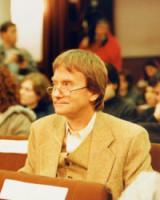Werle, Raymund | Germany

Raymund Werle is a principal research associate with the Max Planck Institute for the Study of Societies at Cologne, Germany. His research is focused on the interaction of institutional and technological innovations, in particular in the information and telecommunications technology industry and in biotechnology. Earlier research includes the development and the international standardization of telecommunications and data networks, the Internet in particular, and their structural and societal consequences.
He has published in the area of science and technology studies, development and governance of large technical systems, organizations and processes of technical standardization but also in the sociology of law and the legal profession and research methodology. Raymund Werle received a Diploma (M.A.) in Economics and Sociology and a PhD in Political Science. He was educated at the Universities of Bonn, Cologne, Mannheim and at the State University of New York at Stony Brook (postgraduate DAAD fellow).
He held research and teaching positions at the Universities of Bielefeld, Mannheim and Heidelberg and at the Research Center on Nuclear Energy in Karlsruhe. In summer 1997 he was Visiting Scholar at the Center for Technology, Policy and Industrial Development, Massachusetts Institute of Technology (MIT); and in October 2003 he visited the Centre for Analysis of Risk and Regulation (CARR), London School of Economics and Political Science.
Project at IAS-STS: New Technologies and the Protection of Intellectual Property: On the Interaction of Institutional and Technical Innovations
Increasing investment in research and development (R&D) and changes in public R&D funding have put pressure on companies and developers to commercialize technical innovations quickly and protect their intellectual property. This, along with increasingly fierce competition, has led to “patent races,” but also to innovations which ensure the protection of intellectual property and to political efforts to extend legal protection to subjects that were not patentable before. These developments influence R&D investment decisions and the path of technical progress.
They have also triggered technical innovations aimed at circumventing intellectual property protection, initiatives towards “open” R&D (Open Source), and a debate about legal reforms to cut through the patent thicket and avoid underutilization of resources that are already protected (the anticommons dilemma). Diverging institutional and technical constellations and traditions at the national and regional level interact with global technological and institutional trends. They set off an interactive dynamic which shapes technical and institutional development and creates new public policy challenges. These issues will be explored by conducting case studies in the areas of information and communication technology and biotechnology but also by re-analyzing historical accounts of the relationship of technical change and intellectual property protection. Theoretical approaches to institutional development will be linked to concepts of technical change.
Selected Publications
Susanne K. Schmidt/ Raymund Werle, Coordinating Technology. Studies in the International Standardization of Telecommunications.Cambridge, Mass., London: The MIT Press, 1998.
Raymund Werle/ Uwe Schimank (eds.) Gesellschaftliche Komplexität und kollektive Handlungsfähigkeit. Frankfurt a.M.: Campus, 2000. Schriften des Max-Planck-Instituts für Gesellschaftsforschung, Bd. 39.
Raymund Werle (Guest Editor) Special issue: Commodification and De-Commodification of Knowledge. Science Studies 14 (2), 2001.
Raymund Werle as member of the Committee to Study Global Networks and Local Values, Computer Science and Telecommunications Board, National Research Council: Global Networks and Local Values. A Comparative Look at Germany and the United States. Washington, DC: The National Academy Press, 2001.
Raymund Werle/ Bernd Holznagel (Guest Editors) Special issue: Internet Regulation Zeitschrift für Rechtssoziologie 23 (1), 2002
